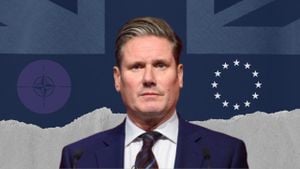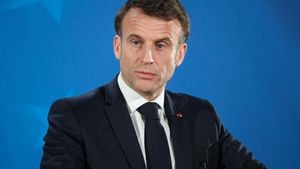Since declaring martial law on December 3, 2024, South Korean President Yoon Suk Yeol has found himself embroiled in political turmoil, drawing mounting ire from opposition parties and causing significant unrest within his own ruling coalition. On December 12, Yoon delivered a defiant address, vowing to ‘fight to the end’ against efforts to impeach him, amid thoughts of what triggered such unprecedented measures.
During his address, President Yoon reiterated his stance, describing the martial law declaration as necessary for the nation’s stability. He asserted, “I will fight to the end,” even as his own party, the People Power Party (PPP), began shifting its support toward likelihood of backing impeachment efforts.
Yoon's martial law lasted only six hours but set off alarms throughout the political spectrum. He justified his actions by claiming they aimed to counter alleged criminal activities threatening the government, particularly from members of the opposition Democratic Party. "I sent troops to maintain order at the National Assembly," he explained, denying any attempts to obstruct legislative functions.
Yet, the gravity of his declaration has led many, including political analysts and citizens, to question the legitimacy of his claims. Various opposition members have termed his statement as 'madness', alleging it showed signs of potential rebellion. The Democratic Party leader has gone as far as calling Yoon's conduct “an expression of extreme delusion” and hinted at efforts to remove him from power.
Simultaneously, tensions among the PPP escalated as significant members, including Han Dong-hoon, their leader, voiced intentions to support Yoon’s impeachment. Earlier, most members had boycotted the parliamentary proceedings meant to address the initial impeachment motion.
Thursday marks another hurdle for Yoon, as the opposition formally submitted new impeachment motions against him, capitalizing on the divisions within his party. Since the martial law decree, only discontent and protests have surfaced, with demonstrators demanding the president's resignation.
Adding to Yoon’s woes, several prominent officials have resigned, and criminal investigations are underway, examining whether he and his close aides engaged in potential violations, which include allegations of insurrection — potentially punishable by death under South Korean law.
The martial law decree incited protests nationwide, as thousands took to the streets, some accusing the government of instilling fear among the populace. Observing this unrest, political scientist Kim Seo-young argued, “It’s hard to fathom how Yoon believes this constitutes governance.”
The political climate poses questions on governance during the next days. With Yoon under inquiry, clarity on who leads the government remains murky. This has raised alarms not just about Yoon’s presidency but also about the stability of South Korea’s democratic institutions.
The martial law decree was swiftly overturned by the National Assembly after massive pushback, but Yoon’s controversial actions ignited fierce debates over the democratic norms the country adheres to. Critics suggest deploying troops to parliament threatens the very concept of democracy.
A day later, opposition parties announced their united front, consolidifying efforts to bring Yoon to account. Amidst chaotic political developments, the nation is on high alert, wary of the potential consequences of Yoon's uncertain future.
While President Yoon Suk Yeol might cling to power for the time being, the tide appears to be turning against him as he faces renewed calls for accountability. His attempted martial law declaration now serves as the cornerstone of his crisis, raising questions on the boundaries of power and the resilience of democratic processes.
History may judge this juncture as pivotal for South Korea, leading not only toward potential impeachment but also altering the political fabric of the nation itself. All eyes remain glued to the National Assembly as the second impeachment vote looms, and it’s clear the battle lines have been drawn sharply between Yoon and his political adversaries.



